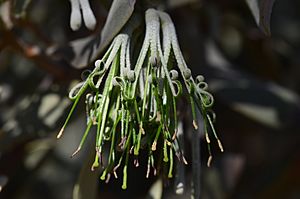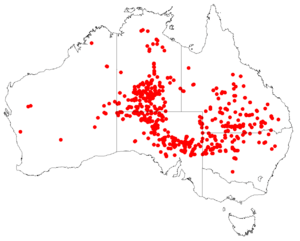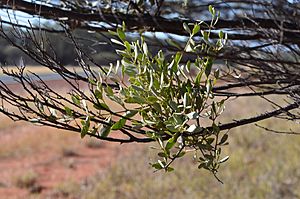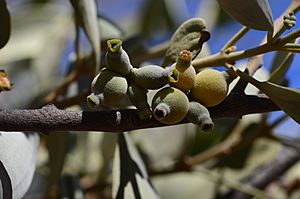Amyema maidenii facts for kids
Quick facts for kids Amyema maidenii |
|
|---|---|
 |
|
| Amyema maidenii | |
| Scientific classification |
|
| Kingdom: | Plantae |
| Clade: | Tracheophytes |
| Clade: | Angiosperms |
| Clade: | Eudicots |
| Order: | Santalales |
| Family: | Loranthaceae |
| Genus: | Amyema |
| Species: |
A. maidenii
|
| Binomial name | |
| Amyema maidenii (Blakely) Barlow
|
|
 |
|
| Collections data for A. maidenii from the Australasian Virtual Herbarium | |
| Script error: The function "autoWithCaption" does not exist. | |
Script error: No such module "Check for conflicting parameters".

Amyema maidenii is a special kind of flowering plant found in Australia. It's often called a "mistletoe" because it grows on other plants, especially Acacia trees (like mulga). It's a hemiparasite, which means it gets some of its food and water from the host plant. But it can also make its own food using sunlight. You can find this plant all over inland Australia, but not in Victoria or Tasmania.
What it Looks Like
The flowers of Amyema maidenii grow in small groups. Each group has three flowers, and these groups appear in pairs, facing each other. All the flowers are "sessile," which means they don't have a stalk and sit directly on the stem. The leaves of this plant are flat.
Where it Grows
Amyema maidenii loves to grow on Acacia trees. These trees are its main hosts, providing it with support and some nutrients.
How it was Named
The first time this plant was officially recorded in an Australian plant collection was in 1860. It was found by a person named Hermann Beckler. He collected it during a famous trip called the Victorian Exploring expedition. This was near a place called Scropes Range in New South Wales.
Later, in 1922, a scientist named Blakely first described the plant. He gave it the name Loranthus maidenii. But in 1962, another scientist, Barlow, moved it to a different group of plants, the Amyema genus. That's how it got its current name, Amyema maidenii.
 | Laphonza Butler |
 | Daisy Bates |
 | Elizabeth Piper Ensley |


